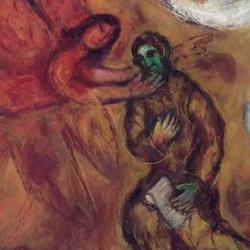The Hebrew word “burden” ( massa ) can refer to a literal load that carried by an animal or person (Exodus 23:5; 2 Kings 5:17; 8:9). It is used in the literal sense of the Levitical crews that carry around the tabernacle and its furnishings (9x in Numbers 4). The Levites are Yahweh’s beasts of burden, His oxen.
It is used metaphorically to describe the “burden” of responsibility (cf. 2 Samuel 15:33; 19:35). And this metaphorical use expands to describe the responsibility or burden that Moses has in carrying all the people around (Numbers 11:11, 17; Deuteronomy 1:12). He is the chief beast of burden, responsible for carrying Israel out of Egypt to Canaan. When he complains that the burden is too heavy, Yahweh spreads out his Spirit and provides more burden-bearers. Already here, the notion of a “burden” has a prophetic connotation – Moses is the chief prophet, and at least two of the men who receive the Spirit that allows them to share Moses’ burden prophesy in the camp (Numbers 11:26-29). Someday, Moses hopes, everyone will have the Spirit and prophesy; everyone will share in bearing the burden of the people.
With the reorganization of the priesthood at the time the temple is built, the burden of the Levites gets redistributed and recast. Instead of carrying literal burdens, the Levites form a choir to sing the “burdens” of Israel’s worship ( massa translated as “song” or “singing” in 1 Chronicles 15:22, 27).
These threads intertwine in the prophetic use of the term, especially in Isaiah (used 10x of a prophetic burden between chapters 13-23). We can say several things about the burden of the prophets.
First, given the Mosaic background, the prophets function as a new Moses when they are given the burden of a prophetic message and deliver it to the people. Though they are not literally leading Israel from Egypt through the desert to the promised land, they are metaphorically bearing the same burden as Moses. Imaginatively, at least, and socially, they carry Israel through the howling waste of judgment and alienation from Yahweh toward a new creation.
Second, given the Levitical background, the prophets are also functioning as “Levites” bearing the burden of Israel’s worship on their shoulders. We might imagine the prophetic task this way: As the Levites carried God’s house from Egypt to Canaan, so the prophets carry Israel, God’s house, from Egypt to Canaan. Or, as the Levites bore burdens to ensure that Israel would worship Yahweh at every stop, so the prophets bear the burden of prophecy to establish the worship of Yahweh everywhere in the land. The fact that the Levitical burden eventually becomes a burden of song fits here too: Song and prophecy are closely linked. The Levitical choir has the “burden” of song, and they also play and sing in order to “prophesy” (1 Chronicles 25:1).
Third, one of the striking things about the prophetic use of the term is that the burdens are often directed against Gentiles. Most of Isaiah’s burdens are for Gentiles, and we see the same in Nahum 1:1 The prophet is not only bearing Israel through the wilderness, but bearing up the load of the nations. This is a new “Levitical” task in the prophetic phase of Israel’s history.
Finally, of course, we should work in all the NT uses of the idea of “burden.” Jesus is the new Moses, equipped with the Spirit beyond measure, so that He can bear the burden of His people through the wilderness, through the cross toward the resurrection. He is the true Levite, who bears the house of God on His shoulders, and the chief Levitical Singer who raises up His Father in His praises. He is the final prophet who with His word bears the burden of Israel and the nations. We can lay our burdens on Him and He carries them; we can throw ourselves on Him, and he will bear us to the Father. But He also has poured out His Spirit on us, so that we can share with Him in bearing one another’s burdens, and the burden of the world.











